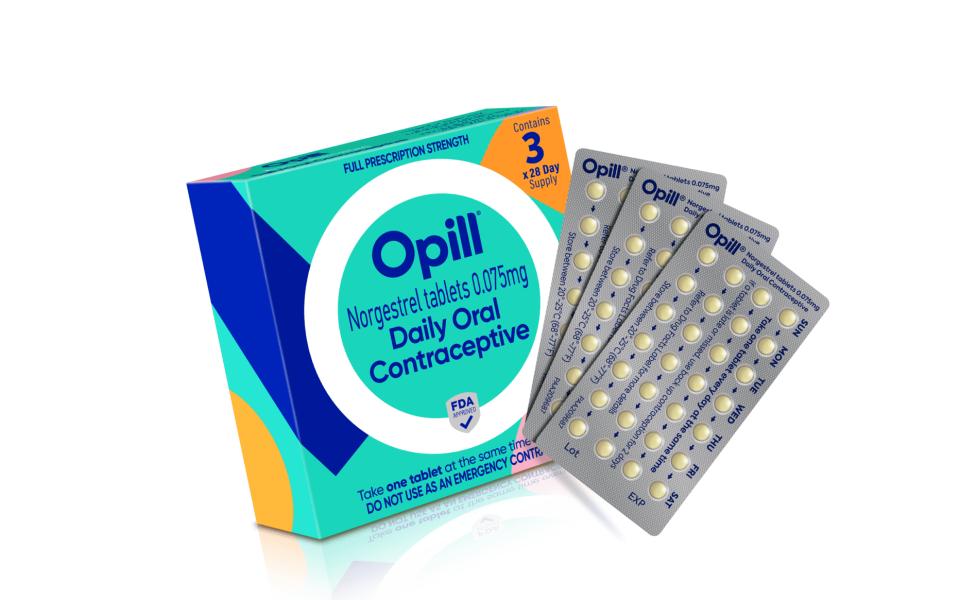Featured photo: Opill, a progestin-only contraceptive pill, will be available without a prescription in the first quarter of 2024, according to its manufacturer. (photo courtesy of Perrigo Company.)
This story was originally published by NC Newsline, story by Kelcie Moseley-Morris
The U.S. Food and Drug Administration announced Thursday it has approved the country’s first daily birth control pill that can be used without a prescription, a move that reproductive health advocates celebrated after more than 20 years of advocating for an over-the-counter option.
The contraceptive, called Opill, is a progestin-only oral pill that could soon become available in drug stores, convenience stores and grocery stores, as well as online, without requiring a visit to a health care provider.
Frédérique Welgryn, an executive at Opill’s manufacturer, Perrigo, said during a press conference Thursday that the company will work with its regional partners to build distribution plans nationwide, and said Perrigo is committed to making Opill affordable, but the retail price is not yet available. The company anticipates the pill will be on sale in major retail stores across the country and online by early 2024 and also plans to work to list Opill as an option with private insurance and Medicaid.
Other reproductive-focused organizations, including the American College of Obstetricians and Gynecologists, celebrated the announcement, as did the American Medical Association. But Dr. Jesse M. Ehrenfeld, president of the American Medical Association, said in a statement that it should be the first step of approval for a variety of oral contraceptive options for over-the-counter use.
“It is important that patients have options when choosing which type of birth control works best for them. We hope this is just the first of several to be approved,” Ehrenfeld said. “We must continue to remove barriers to affordable care for those in underserved, high-poverty and rural communities. We know barriers to oral contraceptives can lead to inconsistent or discontinued use.”
The FDA said Opill should not be used by those who currently have or have ever had breast cancer, and those who have had any other form of cancer should ask a doctor before use. It should not be used with any other hormonal birth control product, including other oral pills, patches or injections, vaginal rings or intrauterine devices. The most common side effects of Opill are irregular bleeding, headaches, dizziness, nausea, increased appetite, abdominal pain, cramps or bloating, according to the approval announcement.
Unintended pregnancy associated with poor outcomes
Welgryn said it took more than eight years to conduct the research for approval and complete the lengthy application process with the FDA.
“This has been a journey fueled by the passion of our team, researchers, health providers, advocates and women themselves, along with the unwavering belief that the women and people of this country should have greater access and fewer barriers when it comes to their reproductive health,” Welgryn said. “Today’s decision follows nearly 50 years of data and research showing that progestin-only pills such as Opill are safe and effective. It follows the joint FDA advisory committee’s unanimous votes recommending Opill … because the benefits of having access to Opill over the counter overwhelmingly outweigh the potential risks.”
Welgryn said an estimated 40 million women in America need contraception, and approximately 15 million of those are using a less effective method or no method at all, while 10 million are already using an oral contraceptive pill with a prescription.
According to research from the Guttmacher Institute, nearly half of the 6.1 million pregnancies in the U.S. in 2011 were unintended, and 18% of those pregnancies were considered unwanted. Further research has determined unintended pregnancy is significantly associated with higher incidences of depression during pregnancy and postpartum, along with higher rates of preterm birth and low infant birth weights.
Dr. Stephanie Sober, global lead of medical affairs for Perrigo, said during the press conference that the country’s current reproductive health landscape makes the pill’s approval all the more important. Fourteen states have near-total bans on abortion, and Iowa could soon join Georgia with a gestational ban at six weeks, before many people realize they are pregnant. Indiana’s abortion ban, which applies to all stages of pregnancy with exceptions for rape, incest, fetal anomalies and the life of the pregnant person, is expected to take effect Aug. 1.
“Opill over-the-counter paves the way for improved access by removing barriers for the people who struggle to access contraception most, particularly people working to make ends meet, people of color, young people, and those who live in rural areas,” Sober said.
“For some, the ability to secure insurance, find a provider, make an appointment, and then obtain childcare and access reliable transportation, all can create an insurmountable obstacle to obtaining contraception. Being able to pick it up at a pharmacy knocks down those obstacles, and it’s truly game changing.”
NC Newsline is part of States Newsroom, a network of news bureaus supported by grants and a coalition of donors as a 501c(3) public charity. NC Newsline maintains editorial independence. Contact Editor Rob Schofield for questions: [email protected]. Follow NC Newsline on Facebook and Twitter.
Join the First Amendment Society, a membership that goes directly to funding TCB‘s newsroom.
We believe that reporting can save the world.
The TCB First Amendment Society recognizes the vital role of a free, unfettered press with a bundling of local experiences designed to build community, and unique engagements with our newsroom that will help you understand, and shape, local journalism’s critical role in uplifting the people in our cities.
All revenue goes directly into the newsroom as reporters’ salaries and freelance commissions.


Leave a Reply